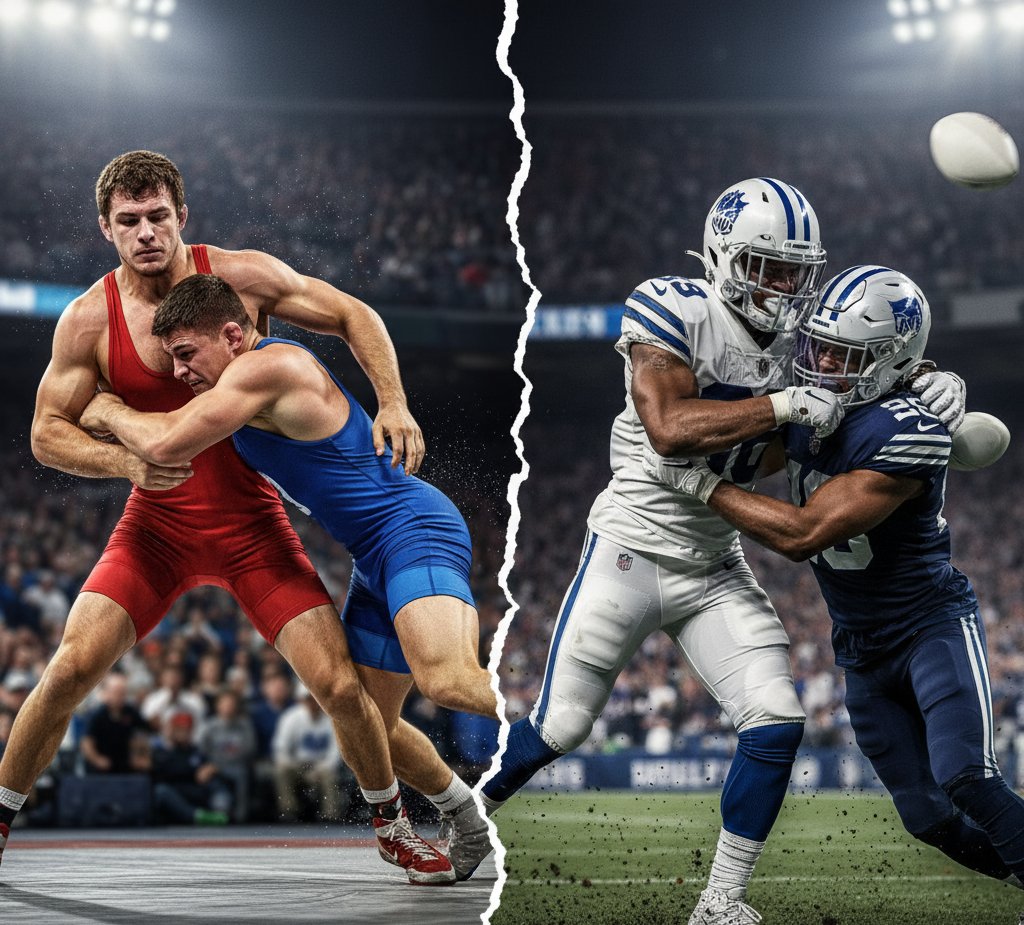Sports fans often debate which sport demands more physically and mentally: wrestling or football. Both sports are extremely challenging, requiring athletes to endure grueling training, discipline, and intense competition. However, when comparing wrestling to football, many athletes, coaches, and sports scientists point out key differences in physical exertion, endurance, and mental toughness.
This article breaks down the comparison, exploring the physical, mental, and strategic demands of each sport to determine whether wrestling is harder than football.
Understanding Wrestling as a Sport
Wrestling is one of the oldest sports in human history, dating back thousands of years. It’s a one-on-one combat sport where athletes compete to control, pin, or outscore their opponent. Unlike team sports, wrestlers cannot rely on teammates for support—success depends entirely on individual performance.
Key Features of Wrestling:
Weight Classes: Athletes compete against opponents of similar weight. Cutting and maintaining weight can be extremely difficult.
Endurance & Conditioning: Matches are short in duration but extremely intense, with non-stop physical engagement.
Strength & Technique: Wrestlers must combine raw strength with refined technique to overpower an opponent.
Mental Discipline: Wrestlers must master self-control, resilience, and focus.
Understanding Football as a Sport
Football is one of the most popular team sports worldwide, combining strategy, strength, speed, and teamwork. It features 11 players per team competing to move the ball down the field and score points.
Key Features of Football:
Team-Based: Success relies on coordination between players.
Explosive Power: Plays often last only a few seconds but require maximum physical exertion.
Specialized Roles: Each position (quarterback, lineman, wide receiver, etc.) demands unique skills.
Contact & Physicality: Tackling and blocking create high risks of injury.
Physical Demands: Wrestling vs. Football
When it comes to physical conditioning, wrestling and football demand very different attributes.
Wrestling Physical Demands:
Requires constant anaerobic exertion during matches.
Wrestlers undergo extreme strength training and cardiovascular conditioning.
Weight cutting is one of the toughest physical aspects, often involving dehydration and strict diets.
Every muscle group is used throughout a match.
Football Physical Demands:
Involves short bursts of energy (sprints, tackles, jumps).
Strength training is essential, especially for linemen.
Conditioning is position-specific (e.g., wide receivers need more speed, linemen more strength).
Recovery periods exist between plays, giving players brief rest compared to wrestling.
Verdict: Wrestling generally requires more sustained endurance and full-body exertion, while football requires explosive power and specialized strength.
Mental Demands: Wrestling vs. Football
Wrestling Mental Demands:
Athletes face opponents alone, which creates immense pressure.
Requires high levels of focus, strategy, and resilience.
Wrestlers must manage pre-match nerves, especially during weight cuts.
A single mistake can determine the outcome of the match.
Football Mental Demands:
Requires strategic teamwork and memorizing complex plays.
Players rely on coaches, quarterbacks, and teammates for guidance.
The mental challenge varies by position (quarterbacks face more pressure than linemen).
Mistakes can be covered by teammates.
Verdict: Wrestling places greater mental strain on the individual, while football spreads the responsibility across the team.
Injury Risks in Wrestling vs. Football
Wrestling Injury Risks:
Common injuries include shoulder dislocations, knee strains, and skin infections.
Weight-cutting can cause dehydration, kidney issues, and fatigue.
Intense training without rest increases the risk of overuse injuries.
Football Injury Risks:
Known for concussions and head trauma due to tackles and collisions.
High risk of ACL tears, broken bones, and sprains.
Long-term risks include CTE (chronic traumatic encephalopathy).
Verdict: Football generally carries a higher risk of traumatic injuries, while wrestling risks stem more from overuse and weight management.
Training and Preparation
Wrestling Training:
Includes running, weightlifting, drilling techniques, sparring, and live wrestling.
Wrestlers often train year-round, even during the off-season.
Training sessions are long, intense, and highly demanding.
Football Training:
Includes strength and conditioning, playbook memorization, position-specific drills, and team scrimmages.
Training intensity depends on the level (high school vs. college vs. professional).
While physically demanding, there is more team support compared to wrestling.
Verdict: Wrestling training is often more individually grueling, while football training emphasizes collective effort.
Popularity and Cultural Impact
Football is more popular in the United States, with the NFL generating billions in revenue and college football drawing massive audiences.
Wrestling, while not as commercially popular, has a strong global presence and is an Olympic sport.
Culturally, football players often receive more recognition, but wrestlers are highly respected for their toughness and work ethic.
So, Is Wrestling Harder Than Football?
The answer depends on perspective:
Physically: Wrestling requires more consistent exertion and conditioning, making it harder on the body overall.
Mentally: Wrestling is tougher due to its one-on-one nature and pressure on individual performance.
Injury Risk: Football carries greater risk for traumatic and long-term injuries.
Team vs. Individual: Football athletes rely on teammates, while wrestlers bear the entire responsibility themselves.
Final Verdict:
For pure physical and mental toughness, wrestling is harder than football. However, football’s high-impact collisions and team strategies create their own unique challenges that cannot be ignored.
Conclusion
Both wrestling and football are incredibly demanding sports that shape athletes into some of the toughest competitors in the world. While wrestling may push individuals harder on a daily basis due to endurance, weight cutting, and mental strain, football remains one of the most physically punishing team sports.
The debate of “is wrestling harder than football” will likely continue, but one thing is certain: athletes in both sports deserve respect for their relentless dedication, discipline, and toughness.

